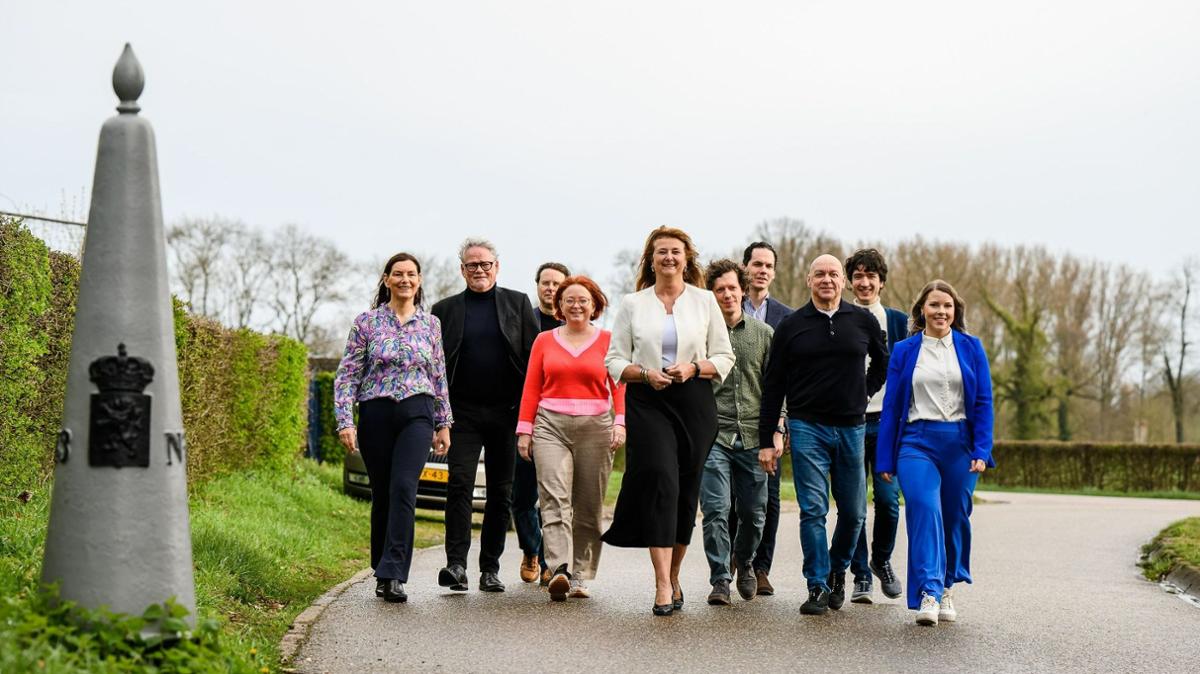 |
| Foreword |
Since the last ITEM newsletter, something has changed in the region, which is expected to have an impact on the Netherlands and thus on our neighbouring countries. The political playing field was shaken, or should we say 'awakened', by the big election win of the ‘Boeren Burger Beweging’ (BBB) in the provincial council elections. A lot can be said about the voters' motives, as they are very diverse. Equally important are the consequences of this transition. These will also be noticeable in the cooperation between Maastricht University and the Province of Limburg.
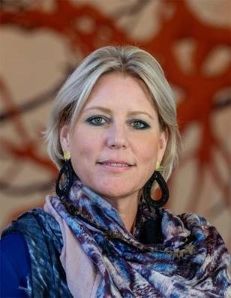
How nature policy and, for example, the approach to nitrogen will be shaped will undergo a change of direction. These and other social issues relating to energy, nitrogen, water and economic developments can only be worked out in cooperation with neighbouring countries. This also means something for diplomatic cooperation and the involvement of knowledge institutes such as ITEM.
ITEM is committed to the internal borders of Europe, more specifically those of the Benelux countries and Germany. It does so on the basis of science-based research, in close consultation with stakeholders from society. That makes it a unique institute that we cannot and do not want to miss. And I don't just mean 'us' in this border region, but that applies to all border regions, all provinces and in a European context. Good neighbourliness cannot be taken for granted. Attention for each other's culture, way of living, living and working means we can build a future-proof living environment together.
We will always have to and want to do this in consultation with our neighbours. A connection between the cross-border programmatic approach at national level and the cross-border project-based approach at regional level is a precondition for quality of life at Europe's internal borders. Ambassador Pieter Jan Kleiweg de Zwaan, in his guest column in this newsletter, compares good neighbourliness in Europe to tending a garden. It is a beautiful, recognisable image, reminding me of the saying 'you will reap what you sow'. Discussions on funding for ITEM are currently ongoing with national and provincial governments. Since its establishment, ITEM has managed to put itself on the map as a cross-border knowledge institute, unmissable in both the scientific and societal contexts. I trust that this will now lead to harvests, nitrogen neutral, that is.
Rianne Letschert
President Maastricht University
|
|
|
|
| Guest column |
“Il faut cultiver nos jardins transfrontaliers”
For 16 months a war has been raging on the European continent. In an unprece dented act of aggression, not seen on our continent since 1945, Russia has invaded and illegally annexed parts of Ukraine -which started already in 2014. dented act of aggression, not seen on our continent since 1945, Russia has invaded and illegally annexed parts of Ukraine -which started already in 2014.
Together with our allies, the Netherlands will continue supporting Ukraine. In any way we can. However long it takes. Every inch of the way.
The Russian war against Ukraine is a dark reminder that good neighbourly relations are never self-evident. Only two generations ago the Meuse-Rhine Euroregion itself was a theater of war,destruction and gross human rights violations.
But after two disastrous world wars, the countries of Western Europe have done the unthinkable since 1945. By pooling sovereignty in crucial areas and creating supranational institutions, we have channeled the inherent conflicts of interests between European states to the meeting rooms in Brussel. The EU in itself is the most powerful mechanism I know to peacefully settle conflicts. We don’t fight in trenches anymore, we have all night European Council summits on the Rue de la Loi / Wetstraat in Brussels, where the only casualty is sleep deprivation of our leaders.
But European cooperation is tough loving. It never comes easily. There are the sirene voices of sovereigntists that call out that there is a better and wealthier world out there, without an EU. Then there are those, also within our midst, that question the very values on which the EU was built, democracy and the rule of law. And finally, we have to deal with our systemic rivals and strategic competitors in the world.
European Institutions, like the European Commission or the European Court of Justice,
are important as guardians of the European treaties and as engines for further cooperation on the European continent.
But they cannot do it alone. Many smaller organizations play a crucial role as well. And one of them is the Institute for Transnational and Euregional cross border cooperation and Mobility – a.k.a. ITEM. ITEM is the blue-collar worker to promote regional cooperation between The Netherlands, Belgium and North Rhine Westphalia.
Cross-border cooperation can be compared to gardening. Everybody enjoys living in a street with well-kept front gardens, but it takes time, creativity and effort by all houseowners to mow the lawns and keep the flower beds attractive. And there is always a peril that if resources and capabilities are scarce, people will only invest in their houses and neglect their gardens.
The same applies to nation states. There is always the risk that investments and political priorities are concentrated on programs within their borders, and that policy makers fail to take the cross-border effects on the flourishing flowers of their neighbors into account.
ITEM has the convening power to bring around one table (regional) politicians, civil serviceexperts, diplomats, the academia and the private sector to discuss cross-border bottlenecksaffecting people’s everyday lives.
ITEM tirelessly reminds us of the importance of a cross-border mind set and that cross-border projects have a strong multiplier effect, be it in mobility, energy transition, fiscal issues, telework, water management, security or labour. Are these subjects technical? Yes. Are they important to our citizens? Yes. And the paradox is that once a cross-border gordian knot is cut, we too easily forget the hindrance that was caused by different national legislations and procedures that existed before on either side of the borders.
In analogy to the metaphor of the garden, and inspired by Voltaire, I’ll leave you with the following thought: “Il faut cultiver nos jardins transfrontaliers”.
Pieter Jan Kleiweg de Zwaan
Netherlands Ambassador in Brussels
|
|
|
|
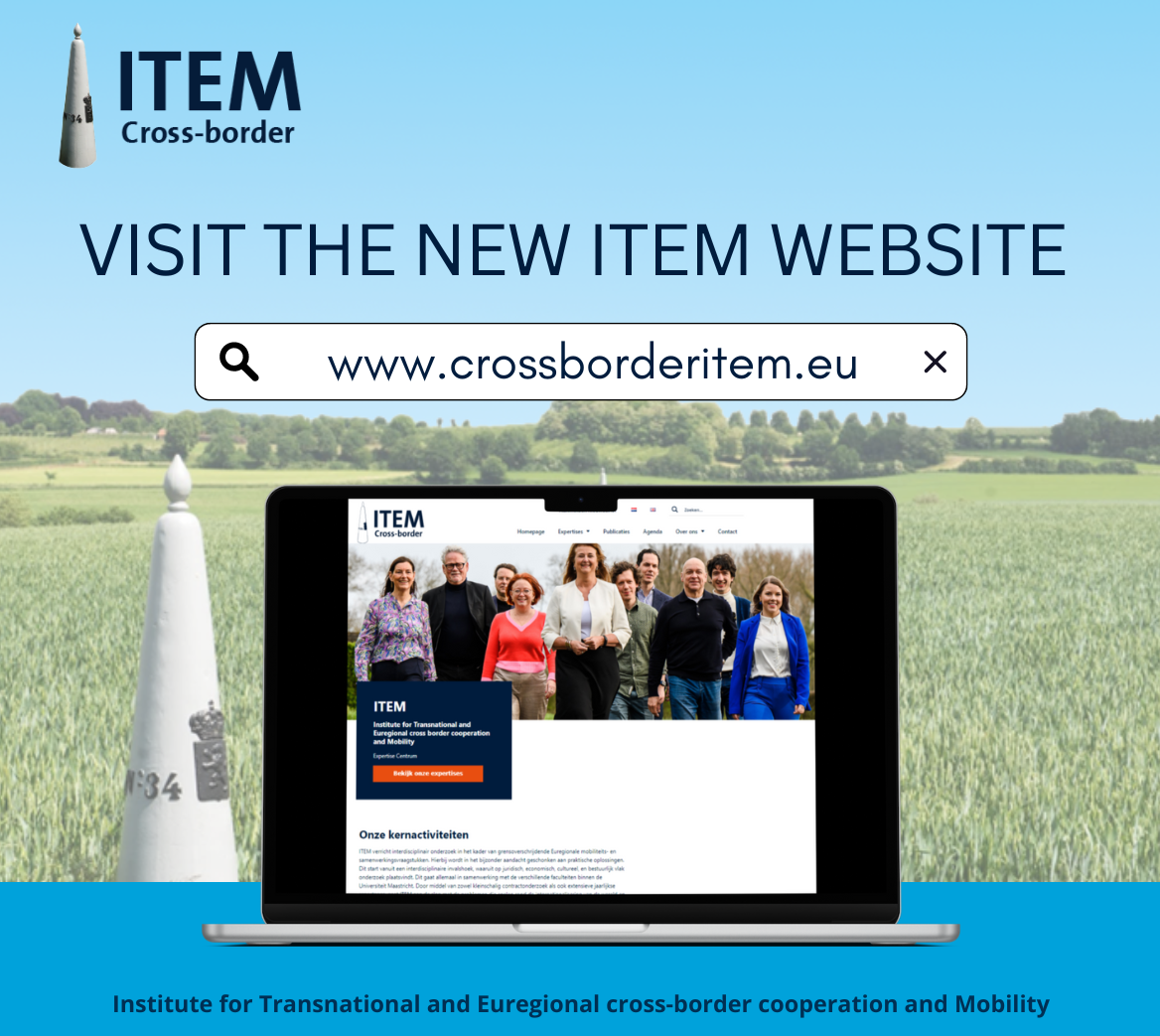 |
| Breaking news: ITEM launches new website! |
We are delighted to announce the launch of our new website. The aim of the new website is to serve as a platform for information about our cross-border activities, providing you an easy way of learning all about our ongoing research projects, areas of expertise, publications, training activities and expert team.
What is new?
Find all cross-border impact assessments, research, cases, reports, blogs and more on the publications page, easily filtered by category and year of publication. We constantly update our content with the latest information and new publications. See what areas of expertise ITEM has to offer and keep an eye on our calendar for our conferences, webinars, workshops and trainings.
About ITEM
We carry out interdisciplinary research in the context of cross-border Euroregional mobility and cooperation issues. Through both small-scale contract research and extensive annual reports (such as the annual cross-border impact assessment), we engage with the issues surrounding the internationalisation of the world and its impact on border regions. Our research revolves around translating scientific knowledge into practical solutions. Together with our partners, we tackle the problems of border regions and generate real impact in society.
Expert team
Our team of experts consists of researchers from different disciplines and organisations, enabling us to offer comprehensive solutions to complex cross-border issues. Our research and advisory services focus on practical challenges, and we work closely with our partners to ensure that our findings are relevant and applicable.
We warmly invite you to explore our website and learn more about our work. Whether you are a researcher, policymaker or community member, we welcome your involvement and collaboration in working towards a better future for border regions and their communities.
If you have any questions, suggestions or comments, please do not hesitate to contact us. |
|
|
|
|
|
| Cross-border inter-organisational cooperation in crime control |
NWO Social Sciences and Humanities (SGW) domain grant awarded
The Netherlands Organisation for Scientific Research (NWO) has awarded a grant under the SGW open competition to a research proposal written by Prof Dr Math Noortmann (Institute for Transnational and Euregional cross border cooperation and Mobility / ITEM) and Prof Dr J.B.M. Koning (UM School of Business and Economics). The project will run for two years and aims to map and analyse cross-border cooperation between police, public prosecutors and municipalities in the Meuse-Rhine Euroregion in an interdisciplinary way.
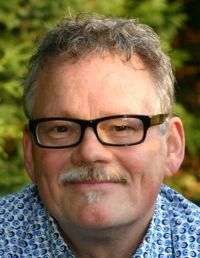 The project brings together researchers from various scientific fields such as law, social sciences, organisational studies and public administration with prosecutors, police officers and municipal officials. In doing so, the research project aims to generate both scientific impact and societal impact.
The project brings together researchers from various scientific fields such as law, social sciences, organisational studies and public administration with prosecutors, police officers and municipal officials. In doing so, the research project aims to generate both scientific impact and societal impact.
The research, focused on cooperation in cross-border crime control, is in line with current discussions within the Meuse-Rhine Euregion, the Limburg security region, the BENELUX and developments in police and judicial cooperation between the Netherlands, Belgium and Germany. Cross-border security is thus an important topic within ITEM.
A total of 60 researchers (out of 180 applications) from Dutch universities and knowledge institutions have been awarded more than 23 million euros from the
SGW Open Competition - M Round 2022. Of these, seven were awarded to
UM researchers. This funding gives them the opportunity to conduct research on a topic of their own choice, without thematic preconditions.
|
|
|
|
|
|
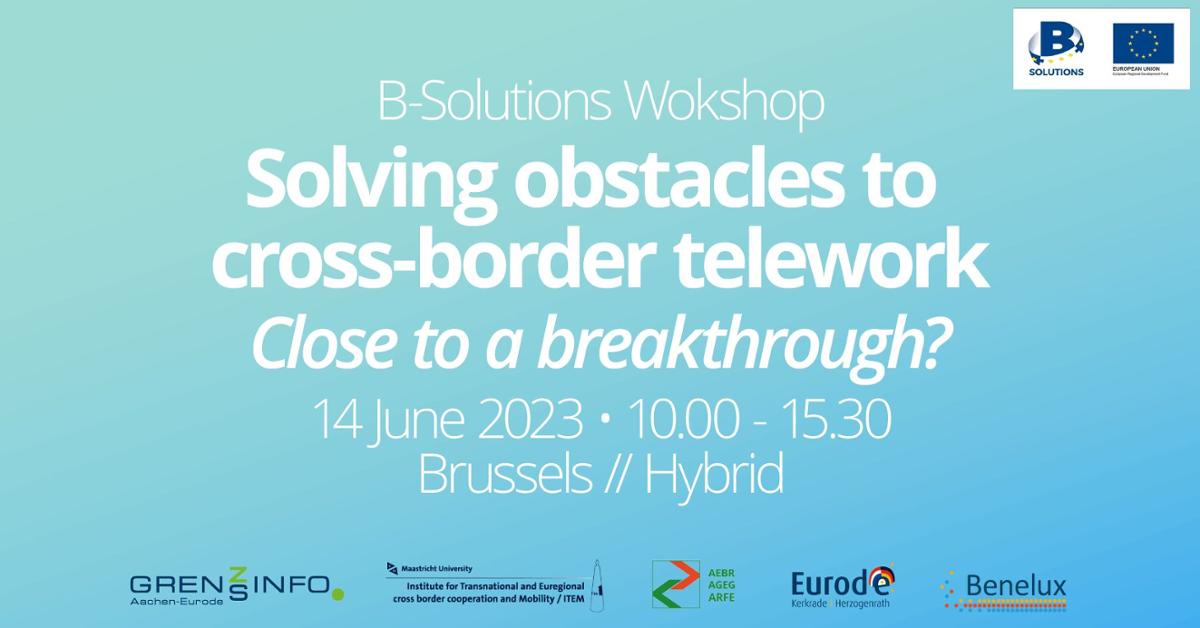 |
| Invitation: B-Solutions Workshop - Solving obstacles to cross-border telework. Close to a breakthrough? |
14 June 10:00-15:30
Secretariat-General Benelux Union, Brussels
On 14 June, a B-Solutions Workshop will be organised by the Grenzinfopunkt Aachen-Eurode, ITEM, and the Association of European Border Regions (AEBR/AGEG/ARFE), with the support of the Benelux Union, in the context of a B-Solutions project funded by DG REGIO. With a focus on the border regions between Germany, the Netherlands and Belgium, the workshop will explore solutions on the issue of teleworking, cross-border working, taxation and social insurance issues, explore how these can be resolved within emerging frameworks at EU and Member State Levels, and discuss the role of key organisations, such as the Benelux, national ministries, AEBR and regions in implementing the recommendations of this B-Solutions case. You are warmly invited to join this workshop and the discussion. |
|
|
|
|
|
| Daan Hovens and Susanne Sivonen at Neighbouring Languages Conference |

On 24 June, researchers Daan Hovens en Susanne Sivonen presented their research at the ‘Neighborouring Languages’ conference. This conference (which took place in Herzogenrath, Germany) is part of theINTERREG V-A project EMR-Lingua and has a clear focus on promoting the neighbouring languages German, French and Dutch. Daan offered a workshop "Maastricht University Challenge: Sharing knowledge, gathering ideas" and Susanne held a lecture entitled “‘Teaching across the border in the Euregio Meuse-Rhine (EMR): legal obstacles and opportunities".
The INTERREG V-A project EMR-Lingua runs from 2021-2023 and has the overarching goal of promoting knowledge of the so-called “neighbouring languages” (Dutch, French, and German) in the Euregio Meuse-Rhine. To this end, a Euregional Centre for Neighbouring Languages has been established. The goal of the Centre is to bring these initiatives together, and to stimulate connections and cooperation between them, so that a central contact point emerges for schools and other interested parties. As a project partner, ITEM contributes to this Interreg project in two ways. First of all, ITEM (Susanne Sivonen and Dorien Coppens) will make an analysis of legal obstacles for teachers working in a neighbouring country (within the Euregio Meuse-Rhine). Secondly, ITEM (Dr. Daan Hovens) will write a report on existing needs, bottlenecks, and practices regarding language and intercultural education at secondary schools. |
|
|
|
|
|
 |
| Next ITEM-Workshop: Horizontal Integration for cross-border territories |
In the academic EU governance world, there has been always a vibrant debate about the relationship between the EU and the member states. Less attention has so far been paid to integration processes at the border of two or more neighboring countries. But, with border regions as living labs of European integration: How to get to grips with the particular integration challenges at the internal borders of the EU? This was the central question of the Next ITEM workshop on Horizontal Integration that took place on 12 May. Prof. Joachim Beck presented his latest publication on the concept of ‘Horizontal Integration’, that conventionalizes the policy area of cross-border cooperation in Europe as a horizontal level of integration.
The concept was commented by Martin Unfried, with the various experiences of ITEM in the different cross-border researches, and by Loth van der Auwermeulen, doing a PhD-research on cross-border intercommunity cooperation. It resulted in an interesting debate about Horizontal Integration as a theoretical concept and the practical implications. A second panel focused on the question of legitimacy and public participation in cross-border cooperation. As prof. Beck noted, a missing factor in cross-border cooperation is often the citizen. Dr. Peter Ulrich addressed the issue of public participation in his keynote.
The debate was productive and showed the relevance of the thoughts behind Horizontal Integration as such. It is also therefore that ‘ITEM embraces and supports the idea of Horizontal Integration’, as director prof. Anouk Bollen-Vandenboorn mentioned in the introduction. Indeed, more work of ITEM will definitely follow soon on Horizontal Integration, both in academic and practical terms, and also in close cooperation with the panelists and speakers. |
|
|
|
|
|
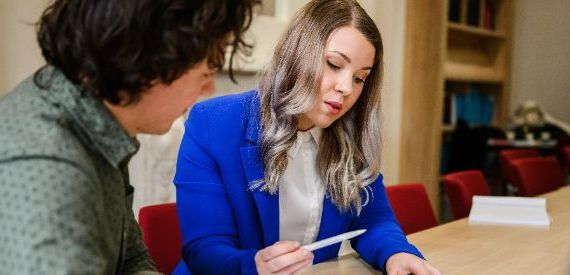 |
| ITEM in the media and contributions |
On 27 February 2023, an overview of recent cases before the Court of Justice of the European Union, written by ITEM-researcher Susanne Sivonen and Pauline Melin, was published in the European Journal of Social Security. Read it here!
|
The ITEM Reflection on the Provincial Elections yielded attention in several media platforms, such as De Limburger, Binnenlands Bestuur, Trouw and Algemeen Dagblad.
|
An opinion of ITEM on the Provincial Elections was published in Reformatorisch Dagblad.
|
Daan Hovens and Susanne Sivonen presented their findings at the Neighbouring Languages Conference of 24 May 2023.
|
Pim Mertens presented the findings of Crossquality, how to measure the quality of cross-border cooperation, at the Interact Knowledge Fair on 23 May 2023 in Ghent.
|
Find the latest publications by the ITEM team here.
|
|
|
|
|
|